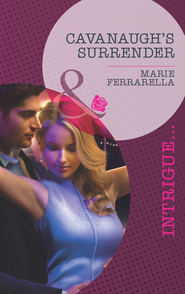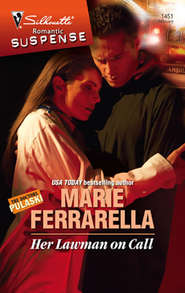По всем вопросам обращайтесь на: info@litportal.ru
(©) 2003-2025.
✖
Her Right-Hand Cowboy
Автор
Год написания книги
2019
Настройки чтения
Размер шрифта
Высота строк
Поля
“I do,” Ena answered.
Nodding, Miss Joan filled up a cup straight from the urn. The coffee in the cup was hot enough to generate its own cloud directly above the shimmering black liquid. Years of practice had the woman placing the cup and its saucer in front of Ena without spilling so much as a single drop.
“Are you hungry?” Miss Joan asked.
Ena shook her head. “No, ma’am, I’m fine,” she answered.
Miss Joan’s eyes narrowed as they pinned hers with a penetrating look. “When did you eat last?” she asked.
She should have known that she couldn’t get away with such a vague answer. She would have no peace until she gave Miss Joan something a little more specific. “I had something at a drive-through early this morning,” she told the woman.
“You’re hungry,” Miss Joan declared in her no-nonsense voice. “Angel,” she called out to the chef she had come to rely on so heavily. “I need an order of two eggs, sunny-side up, two strips of bacon, crisp, and one slice of white toast, buttered.” Her eyes met Ena’s. “Did I forget anything?”
Ena moved her head from side to side. “No. You never do.” It was as much of an observation as it was a compliment.
Other than the fact that Miss Joan’s hair looked a little redder than it had when she’d left Forever, the woman hadn’t changed a bit, nor had she missed so much as a beat, Ena thought. There was something to be said for that.
Waiting on the order, Miss Joan crossed back to Ena. “You back for good?” the woman asked bluntly, not wasting any time beating around the bush.
She wanted to yell out “No,” but instead, she proceeded with caution. “I’m taking it one day at a time.”
Miss Joan surprised her by letting the response stand. “That’s as good a plan as any,” the woman allowed. One of her old-timers seated at the end of the counter called out her name and Miss Joan glared in the man’s direction. “Can’t you see I’m busy talking to Bruce O’Rourke’s prodigal daughter?” Shaking her head, she looked back at Ena. “Some people act as if they were raised by she-wolves and have no idea what it means to have manners.”
Just then, Angel placed the order on the counter between the kitchen and the main room. “Your order’s ready, Miss Joan,” Angel told her.
“I see it, I see it. Keep your shirt on,” Miss Joan replied testily. Picking the plate up, she brought it over to Ena and put the meal in front of her beside the half-empty coffee cup. Moving seamlessly, she automatically filled the cup up. “Let me know if there’s anything else that you need.”
Ena had been debating whether or not to say something from the moment she had finally walked into the diner. She decided that she had nothing to lose. “There is something.”
Miss Joan retraced her steps and returned to the center of the counter. She looked at the young woman expectantly. “Okay, go on.” But before Ena said a word, Miss Joan held her hand up to temporarily stop her. The man at the end of the counter had apparently leaned in to listen to what was about to be said. “This doesn’t concern you, Ed,” Miss Joan said sharply. “Drink your coffee.” It was an order.
“Yes, ma’am,” the old-timer murmured, picking up his cup.
Miss Joan’s eyes shifted back to Ena. “All right, go ahead.”
Ena pulled her courage to her. “Why didn’t you try to find a way to get word to me?” she asked, the question emerging without any preamble.
Miss Joan raised one of her carefully penciled-in eyebrows. “About?”
The woman knew damn well what this was about, Ena thought, exasperated. But because this was Miss Joan, she played along and answered, “My father. And before you say that you didn’t know how to reach me, your step-grandson knew where to find me in order to send that letter notifying me about my father’s death and the fact that there was a will. We both know that nobody knows anything in this town without you knowing it first.”
“You’re giving me way too much credit, girl,” Miss Joan said, deflecting the comment.
“That’s not true, Miss Joan, and you and I know it,” Ena informed her. Her voice grew even more serious. “Why didn’t you let me know my father was dying?”
Miss Joan moved in closer over the counter, lowering her voice. “Because your father didn’t want me to let you know.”
Anger mingled with frustration flashed through Ena’s soul. “The noble warrior, dying alone, was that it?” she asked sarcastically.
Miss Joan didn’t react well to sarcasm, but for once, she let it slide. She answered the question honestly. “You left ten years ago and stayed away all that time. Your father didn’t want some spark of belated guilt being the reason you came back. Besides,” she continued, “your father wanted you to remember him the way he was, not the shell of a man he became just before he died.”
Ena stared at Miss Joan. She wasn’t sure what to believe. “So it was vanity that kept him from getting in touch with me?”
Miss Joan shrugged at Ena’s conclusion. “If that’s how you want to see it. But I always thought you were smarter than that.”
“How else am I supposed to see it?” Ena asked, raising her voice.
Miss Joan looked at her sharply. “Eat your breakfast before it gets cold,” she ordered just before finally turning her attention to the man seated at the end of the counter.
Any appetite she might have had was gone now, but Ena knew better than to just walk away without at least eating some of the breakfast in front of her. Miss Joan would take that as an insult, not just to her but also to the woman she had working in her kitchen. Miss Joan had never been big on compliments, but in her own way she was fiercely protective of the people she took under her wing.
So Ena forced herself to eat as much as she could keep safely down, then, when she was certain Miss Joan was otherwise occupied, she quietly slipped away from the counter. Ena left a twenty-dollar bill beside her plate, thinking that would cover breakfast and then some.
She had reached the entrance and had almost made good her getaway when she felt a hand on her arm. Startled, she looked and saw that the hand belonged to a waitress she didn’t recognize.
The waitress, a girl who might have barely been out of high school, pressed the twenty she’d left on the counter into her hand. Ena looked at the waitress quizzically.
“Miss Joan told me to tell you that she never said anything about charging for the meal,” the waitress told her.
Ena looked down at the twenty. Damn that woman, always getting in the last word, she thought. Just like her father.
Out loud, she observed, “I guess she never said a lot of things.”
“Do you want me to tell her that?” the waitress asked.
Ena shook her head. “No, never mind. Here,” she said, trying to give the money to the waitress. “Consider this a tip.”
But the other woman kept her hand tightly closed. “Can’t,” the waitress protested. “I didn’t earn it and Miss Joan wouldn’t like me taking money like this for no reason.”
With that, the waitress turned on her heel and retreated back into the diner.
Ena sighed. Looks like we’re not in Kansas anymore, Toto, she thought. Ten years in Dallas had caused her to forget just how frustratingly set in her ways Miss Joan could be.
The next six months were going to be hell.
But that didn’t change the fact that Miss Joan’s step-grandson was right. If she walked away from the ranch, her father would have won their final battle. There was no way she was about to allow that to happen. She couldn’t bear it.
“Into the valley of death rode the six hundred,” Ena murmured under her breath, quoting Tennyson’s epic poem “The Charge of the Light Brigade.” She felt as if she were going through the motions of reliving the actual events depicted in the poem.
Except that she was determined to come out of this alive and victorious.
“Hey, boss,” Roy Bailey, one of the hands working on the Double E, called out into the stable. Mitch was inside working with an orphaned foal that was having a great deal of trouble taking his nourishment from the bottle that was being offered to it. “I think she’s back.”
“You’re going to have to be more specific,” Mitch responded, raising his voice while keeping his attention on the foal. “Which she are you talking about?”
“He means Mr. Bruce’s daughter,” Wade answered, speaking up for the other ranch hand. “And from what I can see, she doesn’t look all that happy.”
“I’m guessing she’s had the terms of the will spelled out for her,” Mitch said. “Hey, Bailey, take over trying to feed this little guy,” he instructed the ranch hand, holding out the bottle to him.











